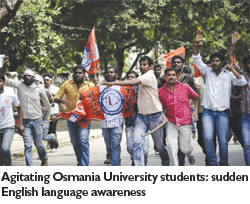An unforeseen silver lining to the dark cloud of partition hanging over the south-eastern littoral state of Andhra Pradesh (pop. 84 million), is the sudden awareness of student leaders, who have been at the forefront of the agitation for and against bifurcation, that English language proficiency is essential for airing their opinions in the national media. Conse-quently several student leaders of Osmania University (estb. 1918) are taking informal lessons in English language proficiency from students of the English and Foreign Languages University (EFLU), Hyderabad. Curiously, although the medium of instruction in Osmania University and its 800 affiliated colleges is English, proficiency in the language is not a prerequisite of admission into its undergrad or even postgrad study programmes in arts, commerce, science and engineering.
 “Because of decades of slapdash, ad hoc policy formulation, there’s a fundamental contradiction in India’s higher ed system which is behind the phenomenon of unemployable graduates. Driven by myopic linguistic sub-nationalism, state governments encourage primary and even secondary education in vernacular languages. But in higher education the medium of instruction is predominantly English. Consequently colleges and universities have been forced to overlook English proficiency while admitting students. The result is students with minimal English language skills struggle to make sense of engineering, science, and business management texts written in English. Subsequently these students are certified on the basis of model answers and textbook passages memo-rised by them with hardly any underst-anding of their subjects,” says a senior science professor at Osmania University, who preferred to remain anonymous.
“Because of decades of slapdash, ad hoc policy formulation, there’s a fundamental contradiction in India’s higher ed system which is behind the phenomenon of unemployable graduates. Driven by myopic linguistic sub-nationalism, state governments encourage primary and even secondary education in vernacular languages. But in higher education the medium of instruction is predominantly English. Consequently colleges and universities have been forced to overlook English proficiency while admitting students. The result is students with minimal English language skills struggle to make sense of engineering, science, and business management texts written in English. Subsequently these students are certified on the basis of model answers and textbook passages memo-rised by them with hardly any underst-anding of their subjects,” says a senior science professor at Osmania University, who preferred to remain anonymous.
Virtually guaranteed a degree because of too-liberal assessment, student leaders haven’t thus far both-ered about English language communi-cation skills. But now experiencing the need to connect with national audi-ences to argue for and against bifurcation of Andhra Pradesh, they have turned to EFLU students for peer-to-peer instruction. “English language skills are absolutely necessary if we are to collaborate and communicate with students across the country. At present we are unable to express our views as we are very poor in communicating in English,” admits T. Mahesh, a student leader of the 300-member Telangana Students’ Federation.
Students of the English and Foreign Languages University, formerly the Central Institute of English and Foreign Languages (estb. 1958), which was accorded Central University status in 2006, are running classes every evening on week days to upgrade the English reading, speaking and writing skills of more than 30 Osmania University students in Hyderabad. The quid pro quo is that the politically savvy Osmania students will support EFLU students during their on and off agitations for better hostel facilities, rights of foreign students and other such issues.
The bandhs, strikes and agitations this time around have had greater imp-act on students of the Seemandhra region — made up of 13 districts — who have been agitating for a united Andhra Pradesh ever since the Congress-led UPA-II government announced its decision in July to bifurcate the state by carving out a new Telangana state comprising 10 of Andhra’s 23 districts. There have been protests on and off at Osmania University too. But fewer academic days have been lost in this part of the state compared to the last couple of years as pro-Telangana proponents await the formation of a new state.
Educators in Hyderabad who are obliged to suffer the slings and arrows of political uncertainty on a daily basis are pleasantly surprised by this peer-to-peer learning initiative. “Students in higher education are too mollycoddled, spoon-fed and dependent upon lectu-rers and professors. This peer-to-peer learning initiative shows that students themselves also need to take respons-ibility for self-development. The out-come of the Osmania-EFLU students initiative will definitely improve the English — written and spoken — of students. This will help them in college/university and in their workplaces after graduation. I hope it will inspire students across Andhra to utilise the time lost due to strikes and bandhs to continue learning,’’ says G.K. Subbarayudu, former professor of English at Osmania University.
Even as the pro and anti-Telangana agitations roll on and on with no resolution of the issue expected in the near future, the impact of this prolonged impasse will be felt several decades later as the pool of intellectuals in Andhra Pradesh — arguably India’s most educationally aware state — dries up. But the possibility of students learning to become self-reliant and innovative in this period of turmoil, makes the bitter pill of opportunities lost because of the hidden agendas of Andhra’s politicians, less bitter.
Aruna Ravikumar (Hyderabad)